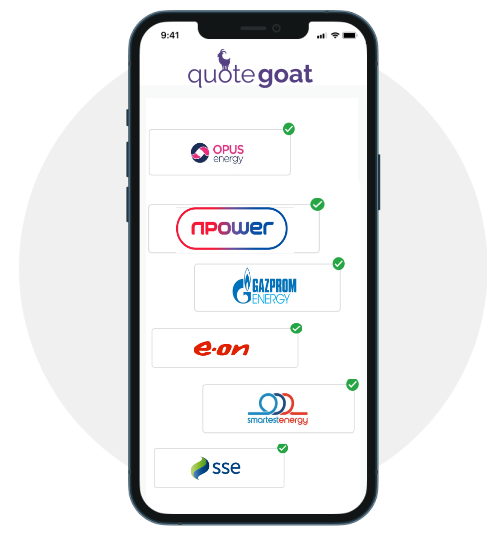Why compare business energy suppliers?
Comparing business energy suppliers and policies as your contract comes up for renewal is a great way to save your business money. The fact is that the average business energy bill has skyrocketed, with SMEs around the country struggling to just keep the lights on. It has never been a more important time to compare prices and make sure you don’t pay more than you need to on your next business energy contract.
Comparing quotes allows you to see just how much you’ll be paying for gas and electric, plus the two standing charges for each. You’ll be able to compare quotes from the Big Six, as well as independent suppliers. Plus, you can choose a supplier with great customer service and reliability, which, as business energy contracts can last years, is super important.
And the best bit? With Quote Goat, it’s really easy. We know that calling around, checking multiple quotes and trying to find a good deal is the last thing you need as a busy business owner. And that’s where we come in. We’ll do all the hard work for you, showing you competitive quotes to power your business.
How to find cheap business energy quotes
The Federation of Small Businesses (FSB) estimates that between February ‘21 and August ‘22, business energy bills have risen by 349% for electricity, and 424% for gas. So cheap business energy just doesn’t exist right now – we’re sorry! But that’s why comparing quotes is so important.
The majority of businesses in Great Britain are eligible for the Government’s Energy Bill Relief Scheme (EBRS), to help support businesses big and small through the energy crisis. The new Government-supported price for all non-domestic energy users in England, Scotland and Wales is:
- £211 per megawatt hour (MWh) for electricity
- £75 per MWh for gas
This price will be automatically applied to your bill, so you don’t need to do anything.
The scheme in its current form will run until 31st March 2023. We don’t yet know what will come after it, but the Government has said it will provide ongoing support to vulnerable industries. For more information on the EBRS, visit the GOV.UK website.
How does business energy work?
Just as with household energy, you pick a supplier to provide your gas and electricity for a set period.
There are two costs to a business energy contract:
- Unit cost: measured in kilowatt hours (kWh), this is the rate you pay for the gas and electricity your business uses. This is often fixed, so you pay that price per kWh of gas or electricity your business uses.
- Standing charge: you also pay a fixed daily charge, which goes towards the cost of maintaining the national grid, energy transportation and running costs.
The price you pay for business energy is also affected by additional charges and taxes, including transportation and distribution costs levied by suppliers, as well as VAT and the Climate Change Levy, which is issued by the Government.
What kind of business energy contract can you get?
When it comes to comparing quotes and choosing a business energy supplier, there are several types of commercial contract to choose from:
 Fixed rate
Fixed rate
The energy unit rates are fixed at a certain price for the duration of your contract. This protects you against price hikes, and helps to forecast the business’ spend. Naturally, though, your bills will fluctuate depending on how much energy you actually use.
 Variable rate
Variable rate
The price you pay per unit goes up and down in line with market prices, for the duration of your contract. There’s a chance you could pay less, but there’s also the risk that you’ll pay more if the market rises. Your bills each month could be quite varied, as they’ll fluctuate based on market price, as well as how much energy you use.
 Deemed rate
Deemed rate
This is a rolling deal that businesses will be put on if they’re out of contract or have just taken on new premises. It’s expensive, and definitely one to avoid or get off as soon as possible.
 Rollover
Rollover
These contracts are used if you’ve not agreed a new contract before your current deal ends and there are no renewal provisions. Rollover contracts are typically very expensive and can also be a bit tricky to leave, so be sure to compare and select a new contract within the renewal period, and let your supplier know your intentions.
Business Energy FAQs
How are domestic and business energy different?
Businesses use energy in a totally different way to households – from the hours they use energy, to the size of the building, and the machines that are run. These differences all need to be taken into account, which means business energy is vastly different to domestic energy, even down to the way you switch.
Most commercial energy contracts can’t be switched in just a few clicks, like domestic energy. Partly, that’s because business energy policies are much longer. It’s also because business energy quotes are based on each organisation’s industry, location, staff and working hours. So, off the shelf policies aren’t really an option.
Finally, commercial energy contracts are split by fuel – there’s no dual-fuel tariff option for businesses. You’ll need to get separate quotes for gas and electricity when you’re shopping around (but don’t worry, we’ll do the legwork for you).
How long are business energy contracts?
Business energy contracts tend to be longer than domestic energy contracts. They can often last up to five years or more, however, most are between one-three years long.
There tends to be a switching window as you near the end of your contract. If you’re nearing the end of your contract and you plan to switch, you’ll usually need to let your supplier know, in case they put you onto an expensive default contract.
You typically wont get a cooling off period after you’ve purchased your contract, like you do with a domestic policy, though. And with contracts lasting years, it’s important to get it right by comparing quotes.
Is business energy cheaper than domestic energy?
The unit price of business energy is usually cheaper than domestic unit prices. However, businesses use a lot more energy, plus they must also meet more criteria, and pay levies and regulations. You also don’t have a cooling off period if you change your mind, and contract terms are much longer than domestic energy.
What is a microbusiness, and do I qualify?
It’s also important to work out whether you are a microbusiness, too, as certain rules apply to the way you’re billed. Ofgem says a microbusiness:
- Has fewer than 10 employees (or their full-time equivalent) and the yearly turnover or balance sheet is not more than €2 million,
- Or uses less than 100,000 kWh of electricity a year,
- Or uses less than 293,000 kWh of gas a year.
If you qualify as a microbusiness, you can get extra protections, such as clarity: brokers and suppliers must make it clear what you’re signing up to, and all the costs involved.
Microbusinesses are also protected from back-billing, meaning you can’t be charged for any unpaid energy used over 12 months ago, if you didn’t have an accurate bill for it before. Consumers enjoy the same protection on their energy bills.
Who needs business energy?
Any business in the UK needs a commercial energy contract. You simply wouldn’t be able to get a domestic policy for a business address.
If, however, you work from home or run your business from home, you don’t necessarily need business energy. You’d need to be registered as a business, as you can’t get business energy as a sole trader. As a commercial customer, you’d have to pay extra VAT, additional levies and charges. Your meter would also sit under a new ‘profile’, which would monitor your usage differently.
So, while it’s possible to get business energy for a business run from home, it’s certainly not necessary if you’re a one-man band. Also, with domestic energy, you can claim for the electric and gas you use while you’re working at home on your tax return, as a legitimate business expense.
Can I get renewable business energy?
Absolutely! When you discuss your requirements with our partners you can request this. There are also specialist business energy brokers and suppliers who solely provide green business energy.
Ofgem also mentions several small business energy grants schemes to help businesses lower their carbon emissions and become more efficient.
What is the Climate Change Levy (CCL)?
The CCL is an environmental tax, which is charged on the energy you use as a business. It’s designed to encourage businesses in the UK to be more efficient in how they operate, and to work towards reducing their emissions in line with the UK’s goal of Net Zero by 2050.
If your business operates in an industrial, public services, commercial or agricultural sector, it’ll apply to you, and is charged on taxable commodities for heating, lighting and power. Your energy supplier collects the CCL charge as part of your payments, and they then pass the money onto HMRC. You can find out more about the CCL on the GOV.UK website.
How does business energy for charities and not-for-profits differ?
If you run a charity or not-for-profit organisation, you’ll be eligible for a 15% reduction on the VAT you pay on your energy, taking it down to 5%. You’ll also be exempt from paying the Climate Change Levy (CCL). All you need to do is contact your supplier and fill in a VAT declaration form.
Moving premises and your business energy contract
If your business is on the move to new premises, you can take your current business energy supplier with you, or you can switch to a new contract. It’s worth ticking it off your to-do list, as out-of-contract tariffs are expensive, and can be tricky to leave in some cases.
You’ll need to let your supplier know your plans if you’re taking them with you. If you decide to switch, your new supplier will let your old supplier know for you. Remember to take meter readings when you leave your old premises, and as soon as you get the keys to your new premises.
What does a business energy broker do?
Business energy brokers are contractors or companies who find and present the best deals and suppliers for your business. They can also look after your energy account, letting you know when your contract is due for renewal, or if your supplier were to go bust.
When you need to switch to a new contract, your broker can manage the whole process for you. Plus, they can review your energy efficiency across the business and help you reduce your energy use.
So far, so good? Well you will need to pay a fee for their services. Often, this is incorporated into the rate you pay, or it might be as a lump sum. It’s a good idea to ask for all terms, including costs and obligations, to be sent to you in writing before you agree to anything.
We think it’s well worth getting quotes yourself via our easy online tool, and save yourself the cost of a broker. Why not give it a go, and see what you think?
What do I need to get a business energy quote?
It couldn’t be easier – just enter your business’ post code and business name, along with your email address and phone number. Our partners will then call you to introduce themselves and you will also need to provide your recent business energy bills if you have them. Our partners will then do the rest, and will give you a call when they’ve found the best deals for your business. Over the phone, they’ll talk you through your options, and offer unbiased, no-obligation advice.





